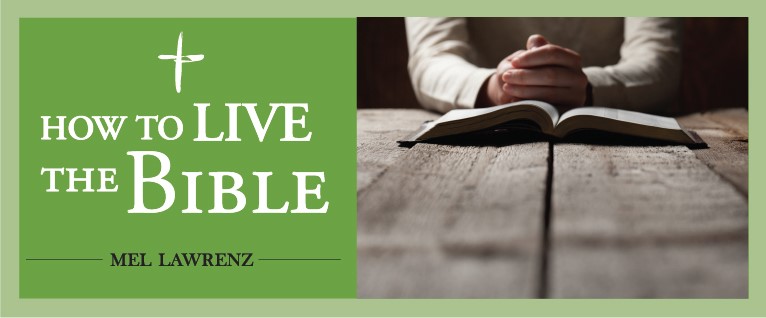
This is the ninety-second lesson in author and pastor Mel Lawrenz’ How to Live the Bible series. If you know someone or a group who would like to follow along on this journey through Scripture, they can get more info and sign up to receive these essays via email here.
See Mel Lawrenz’s book, How to Understand the Bible.
The idea that we need someone else’s help to do what seems to be our responsibility is hard for many people to accept. Living a “clean” life is our responsibility, and we can’t pull it off on our own. Have you ever made a resolution to improve your life in some significant way, and been disappointed to find that your resolve lasted about 30 days (or 30 minutes), and then you were back to your old ways? I’m not talking about something as simple as changing your eating habits or exercise. I’m talking about change of the heart. “I’m going to start being a patient person—right now!” “I’m going to decide not to have this hot anger inside that keeps burning other people.” “I’m going to stop obsessing about the things I want and stop being jealous of others who have more than I do.” I, I, I. It’s like asking a man standing in a barrel how far off the ground he thinks he can lift himself.

The list could go on and on. Certainly there are people who would step forward and say, “I have made resolutions to change my basic attitude, and to behave better around other people, and I think I’ve improved, so don’t tell me I need God’s help.” But that raises a couple of natural questions: Where, then, did you get the concept of how your life could be better? And where do you think you got the desire to clean up your act? And how complete and enduring do you want that purification to be?
But the most important question is about the forward trajectory of our lives: What are we counting on to get us on the right track, keep us on the right track, and have the spiritual energy to move down that track?
How is it possible for us flawed, fractured, fallible human beings to experience what God says:
“Therefore, with minds that are alert and fully sober, set your hope on the grace to be brought to you when Jesus Christ is revealed at his coming. As obedient children, do not conform to the evil desires you had when you lived in ignorance. But just as he who called you is holy, so be holy in all you do; for it is written: ‘Be holy, because I am holy’” (1 Pet. 1:13-16).
“Holiness” means distinctiveness or separateness. Over a thousand times in the Old Testament someone or something is called “holy.” Usually it is God, who is utterly distinct—not in the sense of being removed, uninvolved, or indifferent—but in the sense of being pure. Other times the word is used of teaching devices in the Old Testament to drive home the point that amid the commonness of this world’s pollution, some things can be different. A holy priesthood, holy rites, even holy (consecrated) temple, altar, and temple furnishings.
To seek purification is to seek differentness. Things can be better than they are. Human beings can be better than they typically are. Your experience in life can be higher and better than living like a breathing/eating/working machine with soft parts.
Now here is where that differentness begins: God’s declaration. When the New Testament talks about those who are “saints” (literally, “holy ones”), it means all those who have a connection with God by believing in Christ. The apostle Paul begins many of his letters by addressing “the saints” in the churches he is writing to, by which he means all the believers, not just a separate super-holy class. Here is a simple but radical idea: because a believer belongs to God, he or she has been “set apart” by God even before he or she starts acting “set apart” or holy. You are a saint, in other words, even before you act like one. It is like a parent teaching a growing child to think bigger thoughts, use bigger words, act on bigger principles, by speaking that way. You teach a 12-year-old a bigger vocabulary by using 15-year-old words.
___________
[If you believe this series will be helpful, this is the perfect time to forward this to a friend, a group, or a congregation, and tell them they too may sign up for the weekly emails here]
Mel Lawrenz (@MelLawrenz) trains an international network of Christian leaders, ministry pioneers, and thought-leaders. He served as senior pastor of Elmbrook Church in Brookfield, Wisconsin, for ten years and now serves as Elmbrook’s teaching pastor. He has a PhD in the history of Christian thought and is on the adjunct faculty of Trinity International University. Mel is the author of 18 books, including How to Understand the Bible—A Simple Guide and Spiritual Influence: the Hidden Power Behind Leadership (Zondervan, 2012). See more of Mel’s writing at WordWay.
The post How to Live the Bible — To Be Different appeared first on Bible Gateway Blog.









